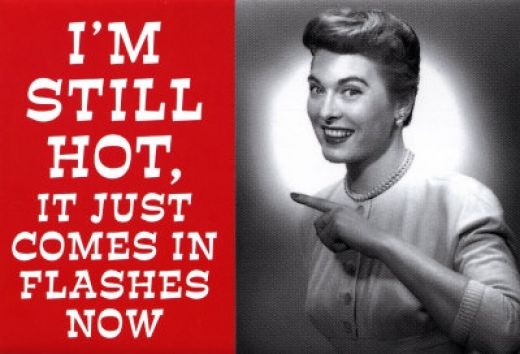Menopause Series Part 1. Menopause and HRT


In this menopause series, I will talk about menopause; what’s done in the NHS, long term implications of HRT, look at some scientific papers and explore your options. This will be over a few blogs that I hope to cover over the next few months.
There are a few ways to look at menopause. Some people are simply glad that they don’t have to deal with the ‘dreaded’ monthly bleed anymore. Others take it harder as a sign that they are now officially ‘old’ (although menopause seems to happen earlier these days, as early as late 30s for some, in those with no ovarian failure). Mostly, I find that women are able to laugh with other women about it; sharing their hot flushes over a cup of tea….
For a lot of women, menopause wouldn’t be so bad if it weren’t for the accompanying signs, symptoms and constant reminder that its actually happening. The hot flushes, the night sweats, palpitations, vaginal issues like dryness or itching, libido issues like loss of libido, discomfort and/or pain during sex, foggy brain, changes in mood, insomnia amongst other things.
It also tends to happen at a point in life where things have finally settled down- you know yourself, kids have left home or you’ve (sort of) figured them out, your personal and professional progress is at a point where there’s an element of predictability. This is undoubtedly a generalisation but on the whole, its a period in life when things seem predictable in a good way. Then menopause comes along to shake things up a little.
In my opinion, the lucky ones get all the symptoms. If I had a pound for every time I hear women commenting on how ‘lucky’ they have been as there had been no symptoms of menopause, I’d be fairly rich. I suppose it is lucky in some ways but I consider symptoms to be a cry for help for the body and also a cry for women to take action. Today, where there are many things that can be done, its not a bad thing.
The traditional way to deal with it ranges from natural, plant based supplementation to HRT that your GP prescribes for you.
You are told to avoid ‘trigger’ factors like spicy foods, coffee etc.
You are advised to eat better, including foods that contain phyto-oestrogens (plant based oestrogens like soy), increase your calcium intake due to potential and probable bone loss and get more sun (Vit D for bone).
You’re also told to exercise more.
Does it work?
Whilst much slower and subtle with herbs and supplements, it does make a difference. The difference is enough for some but not good enough for others.
NHS or regular HRT definitely works but there are a few problems surrounding it. If you have a sympathetic and experienced (in HRT) practitioner, you will probably get a prescription of HRT. They will probably want you to be on it for the least amount of time possible due to potential long term complications like breast cancer and clots. I will go into more depth in a future blog post.
Lifestyle changes will certainly make you feel better overall.
Then why does it still feel like this is an unresolved issue, with women still attempting to find answers as to what to do, despite all the advancements within this field?
Stay with me on future blogs and we will explore this further.